When exploring the world of guitars, the sheer variety of brands can be overwhelming, yet a handful stand out for their quality, innovation, and the trust they’ve garnered from musicians around the globe.
Brands like Fender and Gibson cement their reputations with a consistent output of iconic instruments that have become synonymous with the rock’n’roll hall of fame, cherished by professionals and beginners alike. Your own journey in finding the best guitar brand will depend on a mix of personal preference, playing style, and the musical avenues you wish to pursue.
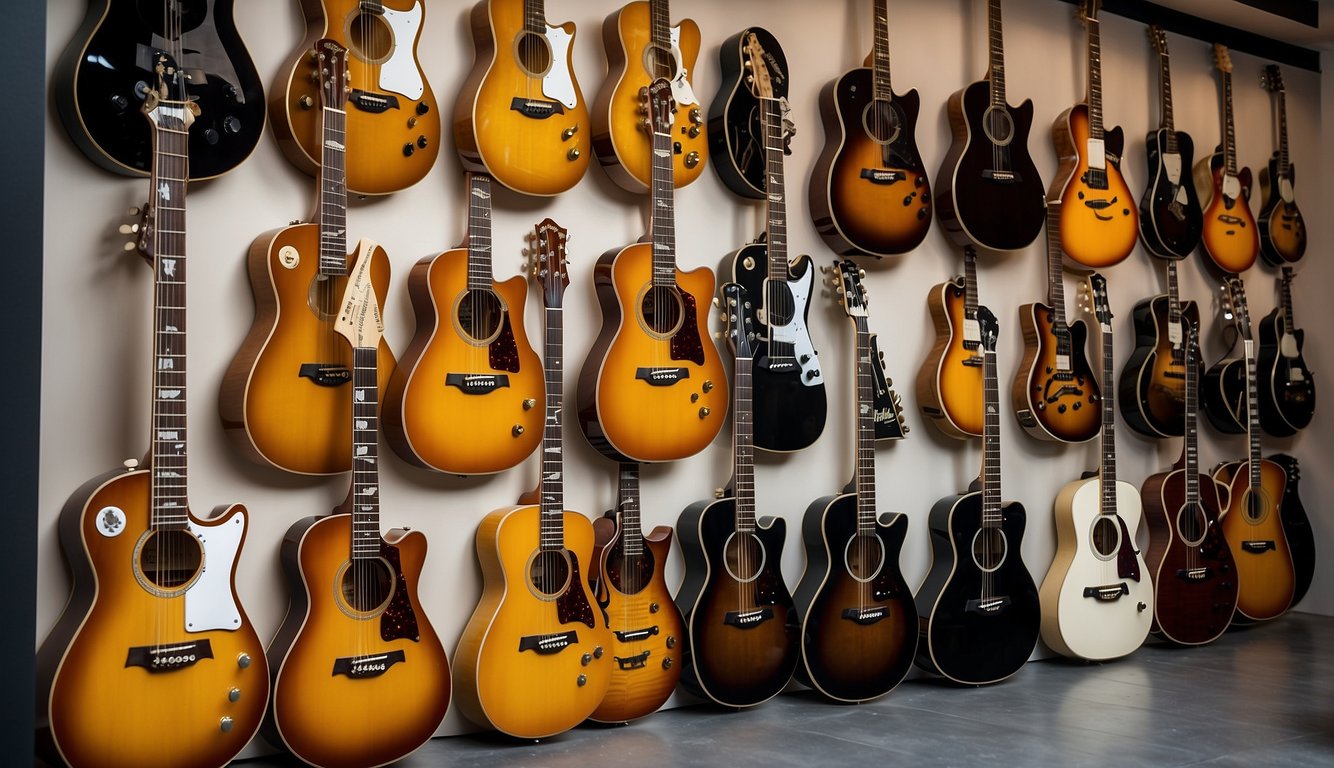
Acoustic aficionados often look to manufacturers like Taylor and Martin for instruments that deliver rich, resonant tones suited for everything from vigorous strumming to delicate fingerpicking.
Their mastery in crafting fine wood into exceptional acoustic guitars ensures that their names are mentioned in conversations about the best guitar brands. Whether you’re seated around a campfire or performing in a sold-out auditorium, these brands have a track record of providing reliable and beautiful-sounding instruments.
For those leaning towards the electric realm, the best guitar brands offer versatility, a range of tones, and the kind of playability that suits everything from jazz to metal. High-performance and craftsmanship are key, and brands like Charvel have built a reputation on precisely these terms.
While the pursuit of the ‘best’ guitar brand is highly subjective, it’s the combination of your unique requirements and the brand’s commitment to quality that will ultimately steer your decision towards the brand that resonates most with you.
Historical Overview of Guitar Brands
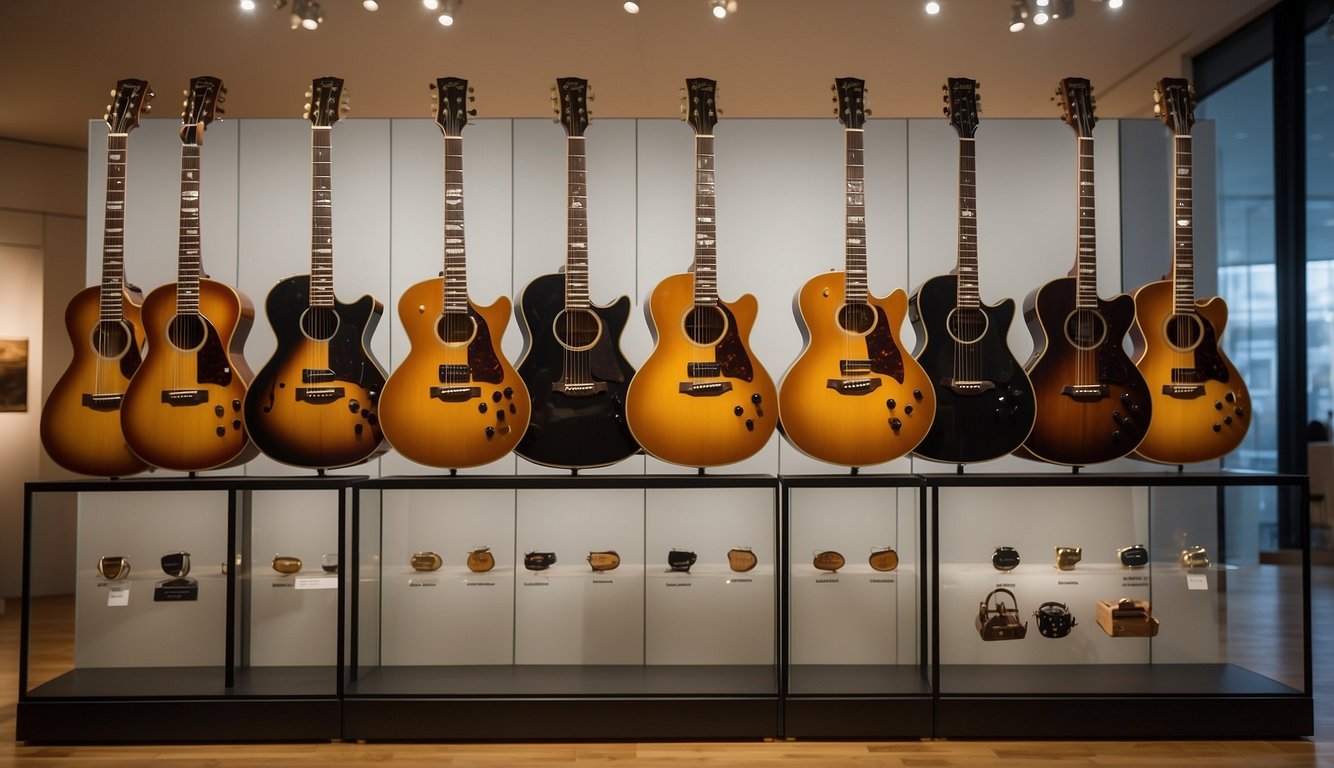
You’re about to explore the rich tapestry that is the history of guitar brands, from the pioneering forefathers to the technological advancements that have shaped the instruments you know and love today.
Pioneers of the Guitar World
The world of guitar manufacturing has been significantly shaped by brands like Gibson and Fender, which have become household names. Gibson, established in Kalamazoo, Michigan, has been fabricating guitars since 1902.
The brand quickly gained prestige for its innovation and quality. On the other hand, Fender, founded by Leo Fender in 1946, revolutionized the guitar market by mass-producing the first solid-body electric guitar, the iconic Fender Broadcaster, later known as the Telecaster.
Evolution of Guitar Manufacturing
As demand for guitars grew, manufacturers like Epiphone challenged established companies by offering professional instruments at a more accessible price point. PRS (Paul Reed Smith) entered the market in the mid-1980s, growing rapidly in popularity due to their high quality and innovative design.
Both the Heritage brand, which emerged directly from Gibson’s original factory in Kalamazoo, and Epiphone, now a subsidiary of Gibson, have continued that same spirit of innovation and accessibility that has been the hallmark of guitar manufacturing evolution.
Significant Innovations in Guitar Design
Throughout the decades, the guitar has seen many design changes. Fender’s Stratocaster, with its contoured body and three pickups, offered a new sound and versatility. Meanwhile, Gibson’s introduction of the Les Paul in the early 1950s with a solid mahogany body and humbucking pickups marked a significant moment in guitar history.
These innovations were not only technical achievements but also profoundly influenced the musical soundscape, from rock ‘n’ roll to blues and beyond.
Evaluating Guitar Brands
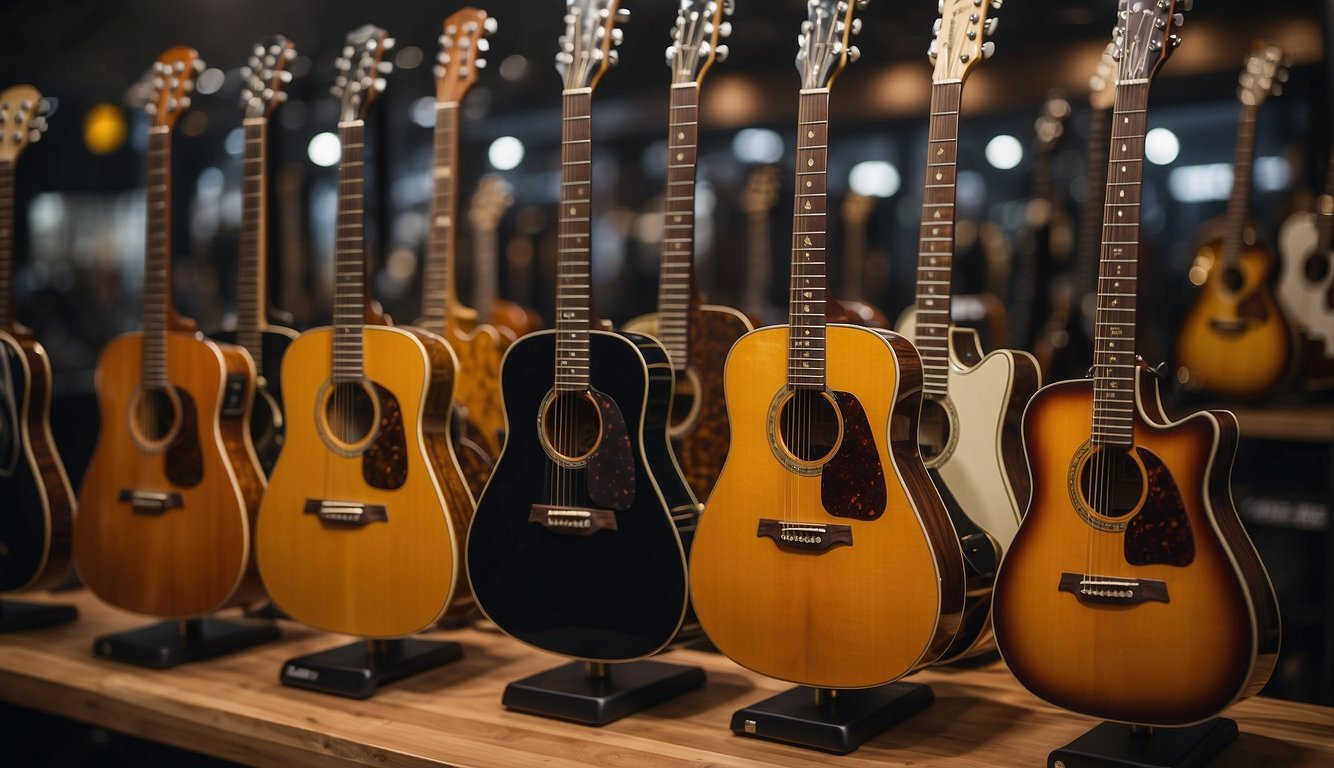
When you’re assessing the best guitar brand for your needs, consider factors such as brand reputation, build quality, and price. The right balance between these aspects will significantly influence your decision.
Factors Influencing Brand Reputation
Brand reputation stems from a history of consistent quality and innovation. As you explore your options, look for brands known for quality control and consistency in their product line. Brands like Fender and Gibson have maintained a strong reputation in part due to their historical significance and continuous presence in the music industry.
Impact of Build Quality on Brand Perception
The build quality of guitars plays a crucial role in brand perception. High-quality materials and meticulous craftsmanship ensure longevity and better sound, which in turn cements a brand’s reputation as premium. For example, Gibson guitars are often praised for their superior build, which includes careful wood selection and attention to detail during assembly.
Price Points and Market Segmentation
Guitar brands cater to various market segments with different price points. Brands such as Squier, an affiliate of Fender, offer more accessible prices, while the parent brand targets professional musicians with higher-priced models. It’s vital to consider your budget and the brand’s offerings within that range. Higher-priced guitars often reflect the investment in build quality and design innovation.
Remember, the best guitar brand for you should align with your specific needs, considering the build quality, innovation embedded in the design, and market positioning in terms of price and reputation.
Top Guitar Brands for Electric Guitars
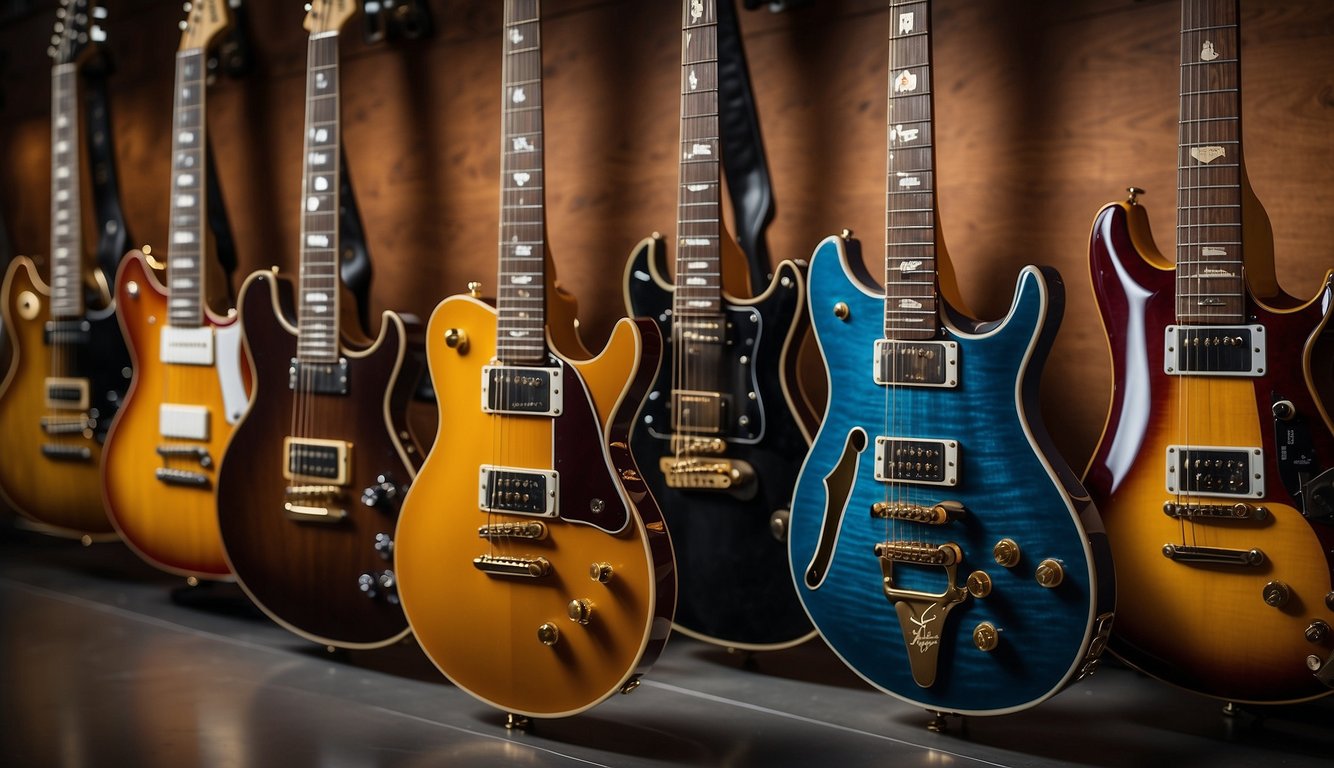
When you’re in the market for an electric guitar, knowing the distinct characteristics and the historical impact of top brands can guide your choice toward a guitar that best suits your style and needs.
Fender: Versatility and Legacy
Fender is renowned for creating the Stratocaster and Telecaster, models that are versatile across various musical genres. The intricate designs, including custom pickups, offer a unique playing experience whether you’re into rock, blues, or country.
Gibson: The Iconic Les Paul and SG
Gibson stands as a monolith in the guitar world with the Les Paul and SG models. These guitars have been the backbone of rock music, characterized by their rich, powerful tones and sustain that complement both rhythm and lead playing.
Ibanez: Innovation in Fast Playing Designs
With a reputation for slim neck profiles and lightning-fast action, Ibanez electric guitars are a top choice for shredders and metal enthusiasts. Their innovative approach caters to fast playing and technical proficiency, making them favorites among progressive and metal guitarists.
PRS: Balancing Art and Utility
PRS (Paul Reed Smith) guitars blend exceptional craftsmanship with practical playability. With models like the Custom, they offer not just aesthetically pleasing instruments but also versatile soundscapes suitable for multiple genres including rock and metal, thanks to their high-quality pickups and materials.
ESP and LTD: Metal and Hard Rock Staples
ESP and its more affordable line LTD deliver guitars with aggressive styling and tones favored in metal and hard rock. They equip players with reliable, durable instruments that can withstand the rigors of fast playing and high-energy performances.
Leading Acoustic Guitar Brands
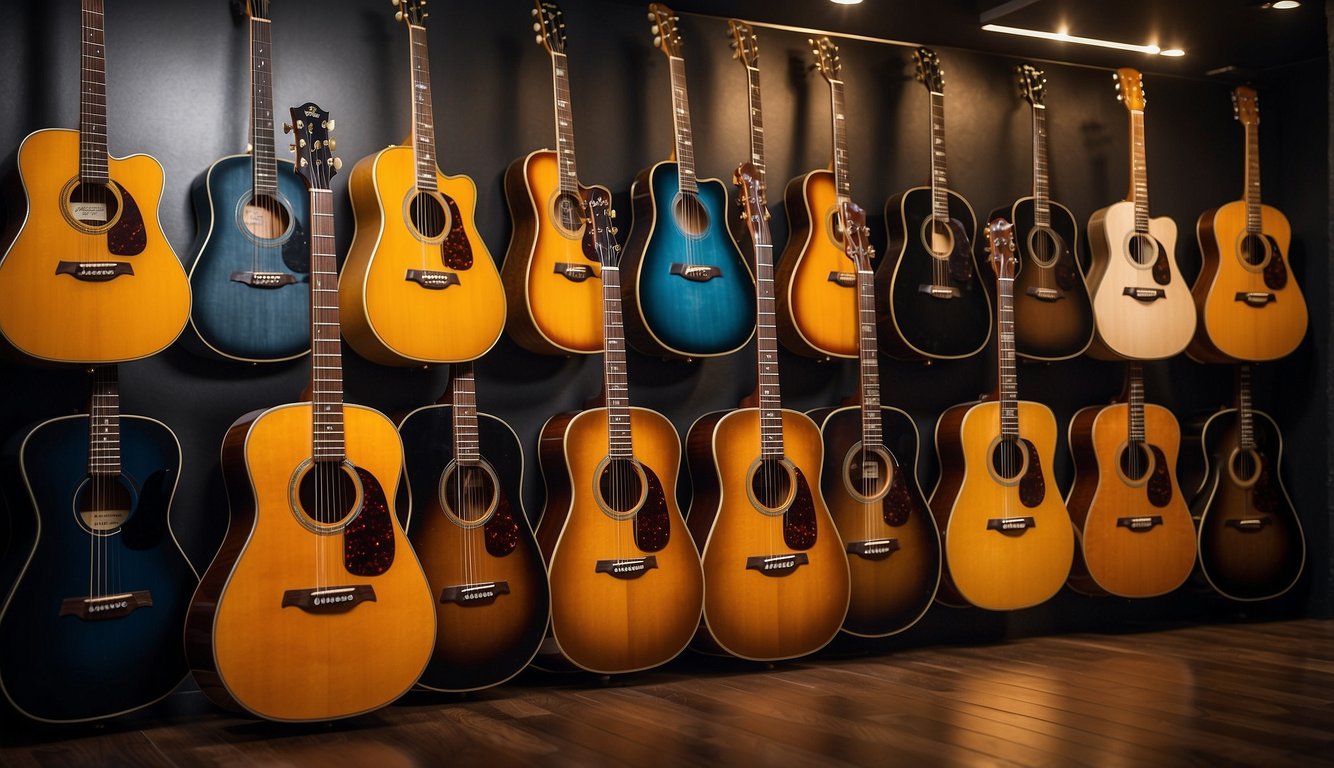
When exploring acoustic guitar brands, consider your playing style and the guitar characteristics that are most important to you, such as sound quality, build, and value.
Martin: The Choice for Traditionalists
You’ll appreciate Martin guitars for their rich history and classic models like the D-28. Renowned for their spruce tops and X-bracing, these guitars are excellent for fingerpicking and provide consistent intonation across the fretboard.
Taylor: Modern Design and Playability
Taylor stands out with their modern approach to acoustic guitar design, focusing on playability and innovation. Their sleek necks and varied body shapes cater to your playing comfort, and the clear, balanced tone accommodates a wide range of musical genres.
Seagull: Value and Craftsmanship
For excellent value without compromising on craftsmanship, Seagull guitars are a solid choice. They are recognized for their quality construction with solid tops, often made of cedar or spruce, and their attention to detail ensures reliable intonation and durability.
Yamaha: Versatility for Beginners and Pros
Yamaha guitars offer versatility and affordability, making them ideal for both beginners and seasoned players. Their range includes models with excellent spruce tops and a reputation for durability. The sound quality and playability of Yamaha guitars often surpass expectations for their price point.
Affordable and Mid-Range Guitar Brands
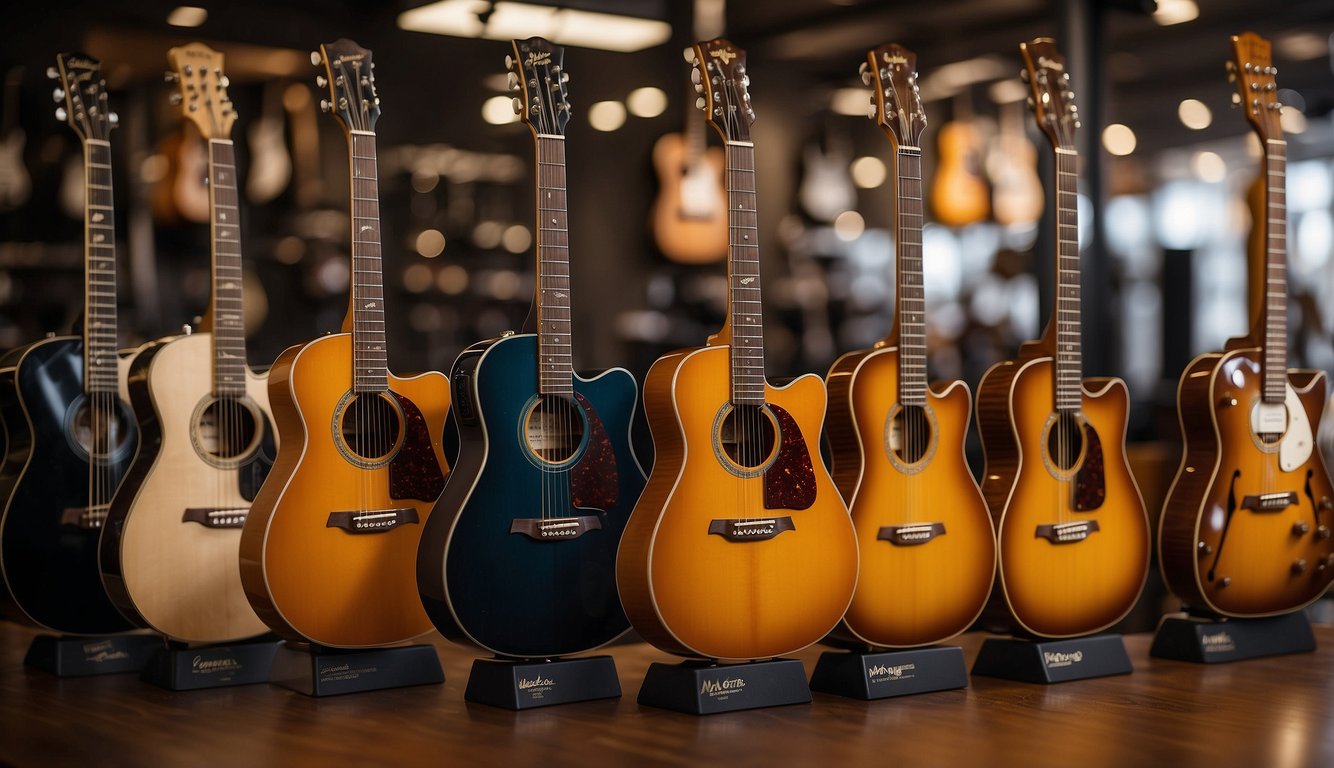
When you’re searching for a guitar that accommodates both your budget and your desire for quality, several brands offer remarkable options. These brands balance craftsmanship and cost-effectiveness to provide instruments that can appeal to beginners and intermediate players alike.
Squier: Fender’s Accessible Line
Squier is renowned as a subsidiary of Fender, bringing you guitars that echo the classic Fender designs at a more accessible price point. The Squier series, including the Affinity and Classic Vibe, are perfect if you’re a fan of the Stratocaster or Telecaster vibe but limited by budget. Tailored for beginners, these guitars feel comfortable in hand, making your initial learning curve less steep.
Epiphone: Gibson’s More Economical Counterpart
As Gibson’s sister brand, Epiphone offers versions of the famous Gibson models like the Les Paul and SG. Their instruments like the Epiphone Les Paul Standard or SG Special are ideal for those seeking Gibson’s signature sound without the high-end price tag. This brand is celebrated for producing instruments suitable for various playing levels, including cost-effective choices for beginners.
PRS SE: Quality Within Reach
The PRS SE series, including popular models like the PRS SE Custom 24, offers a mid-tier selection boasting the quality PRS is known for. You’ll find these guitars equipped with features usually reserved for premium models such as bird inlays and PRS’s patented molded tremolo. If you aspire to own a PRS but are mindful of your spending, the SE line could be your best ally.
Yamaha and Ibanez: High Value Choices
Yamaha guitars provide dependable quality across a range of musical applications. Their classical guitars have a solid reputation for craftsmanship even at lower price ranges. Ibanez guitars, particularly in the GIO series, are a popular choice for those looking for a budget-friendly option, especially in the rock and metal genres. The brand is also respected for offering a variety of body shapes and sizes to cater to a diverse set of preferences and playstyles.
Unique Guitar Types and Their Brands
![]()
When exploring the diverse landscape of guitars, you will find a myriad of unique types, each associated with specific brands that excel in their production. These instruments range from those that have carved a niche in jazz and blues to the innovative extended-range and custom-designed models that cater to particular artists or genres.
Semi-Hollow and Hollowbody Guitars
Semi-hollow and hollowbody guitars are treasured for their rich, resonant tones ideal for jazz, blues, and rock. Gibson stands out with its legendary Gibson ES series which began with the ES-335.
These guitars are known for their versatility and sustain, thanks to the central block of wood that prevents feedback at high volumes. For a pure hollowbody experience, models like the Gibson ES-175 have been the hallmark of jazz guitarists. Another notable mention is D’Angelico, reviving the allure of archtop jazz guitars with modern playability and craftsmanship.
Extended-Range and Signature Models
Ibanez is renowned for both its extended-range guitars, which include seven, eight, and even nine-string options, and its signature models, like the RG550, that have become mainstays in the metal and rock domains.
These instruments are designed to accommodate a broader range of notes, opening the door to innovative playing styles and genres. Meanwhile, PRS SE Custom 24 guitars offer a 24-fret, extended range versatility with signature PRS quality and design, making them a staple for musicians seeking a premium playing experience.
Special Edition and Custom Guitars
Custom guitars are a realm where individuality and exceptional craftsmanship intersect. Limited edition and custom guitars often incorporate unique materials, finishes, and hand-crafted attention to detail.
Rickenbacker is one such brand that offers limited edition models, known for their distinctive jangle and chime heavily associated with the British Invasion rock era. Another is PRS, which frequently releases limited edition models that showcase intricate woods and finishes, pushing the boundaries of guitar aesthetics and performance.
Guitar Accessories and Modifications
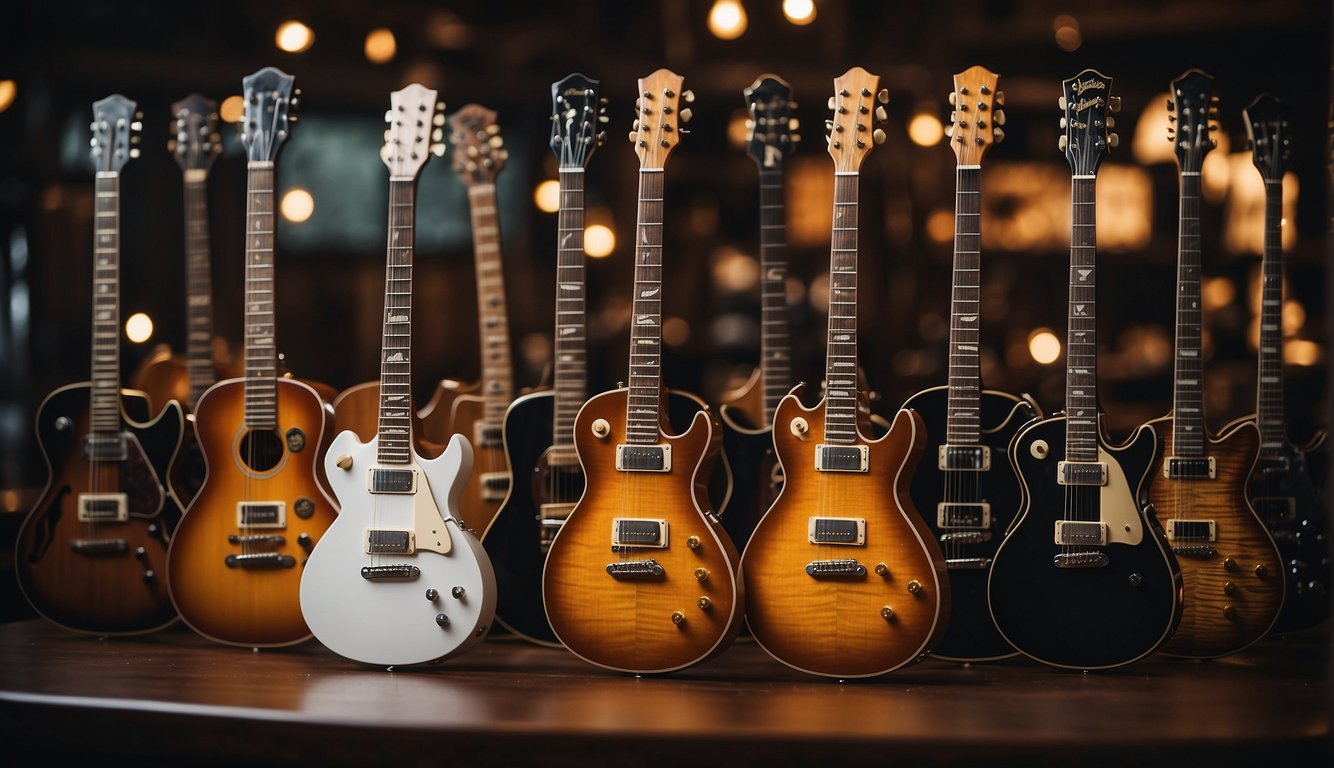
Upgrading your guitar’s accessories and modifications can transform playability and tone. Specific pick-up types and neck profiles can make a profound difference in sound and comfort for any guitarist.
Pickup Types and Sounds
Pickups are fundamental in shaping your guitar’s voice. Two main types are single-coil pickups and humbucking pickups.
- Single-Coil Pickups: Known for their bright and clear sound, they are favored for genres like country, blues, and classic rock. However, single-coils can be prone to picking up electrical interference.Types of single-coil pickups:
- Standard single-coil: Crisp and articulate tone.
- Noiseless models: Reduce hum while maintaining a single-coil sound.
- Humbucking Pickups: These pickups are designed with two coils, canceling out the hum single-coils can produce. They’re preferred for their warm, rich sounds, ideal for heavier music genres.Features of humbucking pickups:
- Less interference: Dual coils cancel out electromagnetic hum.
- Versatility: Split-coil technology allows a humbucker to mimic a single-coil tone.
One notable modification for either pickup type is a treble bleed circuit, which maintains the high frequencies of your tone even when you reduce the guitar’s volume.
Neck Profiles and Materials
The neck’s profile and material directly influence the playability and tonal characteristics of your guitar. Key attributes include the neck’s shape and the wood it is made from.
- Neck Profiles: This describes the shape of the neck cross-section which affects how the guitar feels in your hand. Common profiles include the “C” shape (comfortable and versatile) and the “U” shape (thicker, preferred by players desiring substantial neck grip).
- Neck Materials: The two main materials used for guitar necks are maple and mahogany.Comparing neck materials:
Material Tonality Durability Feel Maple Bright and snappy High Smooth Mahogany Warmer and resonant Moderate Typically slick
Maple necks particularly stand out for their bright tonality and durability. They often contribute to a snappier sound, especially noted in the attack of each note. Maple also offers a smooth and fast playing experience, favored by many lead guitarists.
Buying Guide and Final Recommendations

When selecting the best guitar brand, it’s crucial to consider your playing style, needs, and budget. This guide aims to give you clarity on how to make the best choice and where to seek the most reliable buying advice.
Deciding on the Best Guitar Brand for You
To determine the best guitar brand for your needs, you should assess the following criteria:
- Playing Style: Are you buying an acoustic for fingerstyle or an electric guitar for rock? Some brands specialize in one type over the other.
- Experience Level: If you’re a beginner, look for brands that offer starter models. For experienced players, brands with custom or high-end models may be preferable.
- Budget: Set a budget limit. Brands like Fender and Gibson offer ranges from budget Squier and Epiphone models to their premium lines.
- Genre-Specific Features: Best electric guitars for metal may have active pickups, while those for blues might feature vintage single-coils.
Preferred Models: Research and create a shortlist. Popular models include the Fender Stratocaster for its versatility and Gibson Les Paul for its rich tone.
Where to Find Reliable Buying Advice
For trustworthy buying advice and reviews:
- Official Brand Websites: They provide specifications and details on their full range of guitars.
- Online Retailers: Sites like Sweetwater offer customer reviews, detailed product descriptions, and helpful comparison tools.
- Music Magazines and Websites: Look for recent articles about the best guitar brands from reputable sources.
| Source | Benefit |
|---|---|
| Brand Websites | Official specs and authorized dealers |
| Sweetwater | Extensive reviews, buyer’s guides |
| Music Forums | Community insights and personal stories |
Always cross-reference multiple sources, and try to play a few models in person before making your final decision.
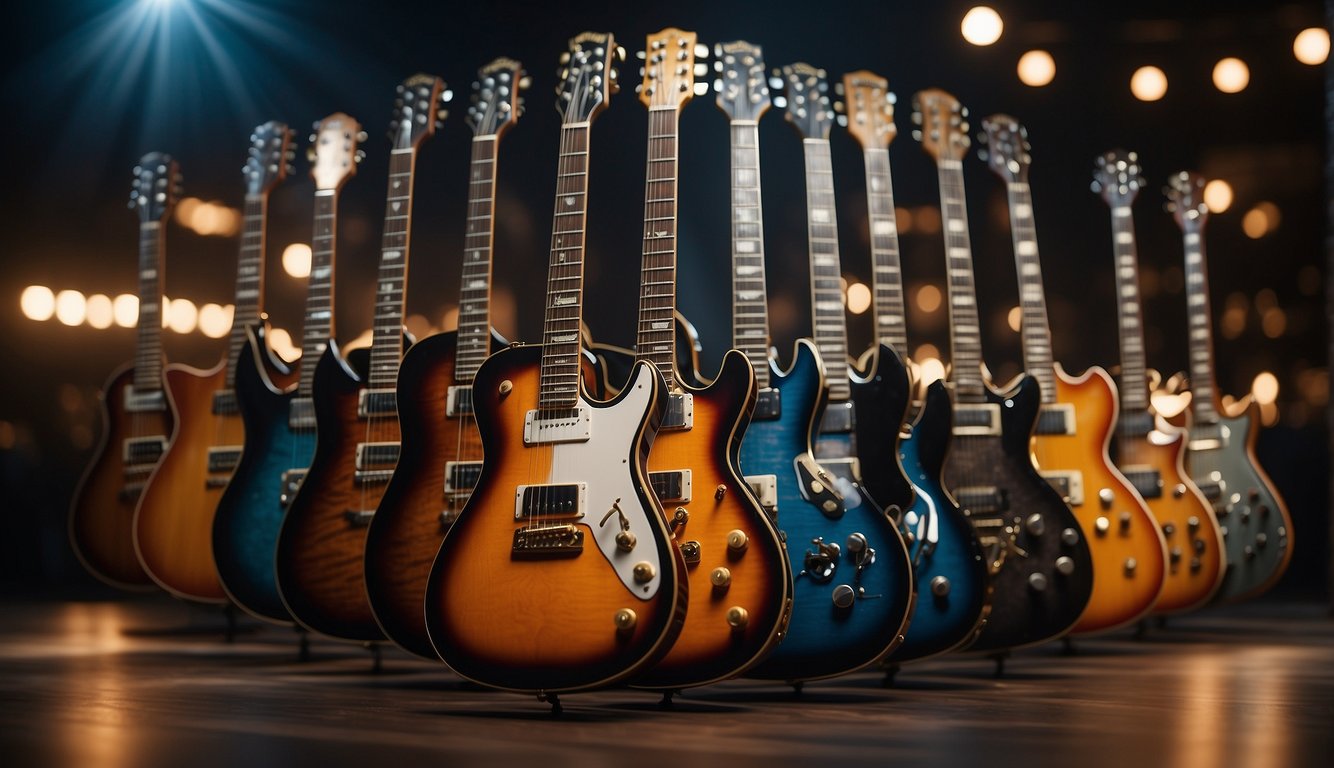
In your quest to find the best guitar brand, you’re faced with a multitude of options, each with its own merits. Top brands like Gibson, Fender, and Martin have consistently proven to be reliable choices, celebrated for their craftsmanship and the quality of their sound. These brands have solidified their reputations through years of service to both novice and professional musicians alike.
When considering an electric guitar, models like the Gibson Les Paul or the Fender Stratocaster may come to mind, beloved for their iconic tones and cultural impact. On the acoustic side, Martin guitars resonate with a warmth favoured by many players.
While classic brands hold strong, emerging luthiers and companies are also garnering attention with innovative designs and technologies. Your personal playing style, aesthetic preferences, and budget will influence your ideal choice.
Here’s a quick reference guide to aid your decision:
| Electric Guitars | Acoustic Guitars |
|---|---|
| Gibson Les Paul | Martin D-28 |
| Fender Stratocaster | Taylor 814ce |
| PRS Custom 24 | Gibson J-45 |
Remember to play various models to truly understand their feel and sound. The best guitar brand for you is the one that complements your unique style and meets your performance needs. Whether you’re strumming chords at home or shredding solos on stage, the right instrument will inspire and elevate your musical journey.
